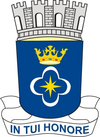Pombal (Paraiba)
| Pombal | |||
|---|---|---|---|
|
|||
| Nickname(s): Terra de Maringá (Maringá Land) | |||
| Motto: In Tui Honore | |||
 |
|||
| Country | Brazil | ||
| State | Paraíba | ||
| Area | |||
| • Total | 888,811 km2 (343,172 sq mi) | ||
| Population (2006) | |||
| • Total | 31,524 | ||
Pombal is a Brazilian municipality in the State of Paraíba. Located at an altitude of 184 meters. According to the Brazilian Institute of Geography and Statistics (IBGE), in 2006 it had an estimated population of 33,212 inhabitants. Its territorial area is 889 km².
It was along the rivers that flourished early civilizations of the world, giving a new direction to human history, in turn call river civilizations. And the decisive factor in the colonization of Pombal was the Rio Piancó.
The penetration paraibano was made by agricultural and pastoral purposes.
Right in the late seventeenth century, around 1696, the pioneer Theodosius Canate, after many battles with the natives, reached the location of the landmarks of the founding of Festival of Piranhas, the right bank of the river Piancó.
The interior, hitherto unexplored was occupied by the tribes of the family Cariri - the PEGAS and PANATO.
The city received three names. The first Festival of Piranhas (1696), the last village of Nossa Senhora do Bom Sucesso (1719) and by royal charter of July 22, 1766 was elevated to the category of town with the name of Pombal. Homage to the First Minister of the king of Portugal D. José I, the Marquis of Pombal (Sebastião José de Carvalho e Melo). High category of life came the official installation to 4 May 1772.
The town became a district on October 15, 1827, and July 21, 1862 was granted city outlaws the seat of the municipality is a great brand of Luso-Brazilian ties.
The county of Pombal was established in 1831 and was supplied in 1882 and restored by the State Law No. 330 of November 11, 1898 based on Patos.
Under the State Law No. 330 of 1907 moved the headquarters to the city of Pombal.
The county of Pombal is 2 Sub-division, covering the cities of Lake and São Paulo, Danvers, São Domingos de Pombal and São Bento de Pombal.
...
Wikipedia


